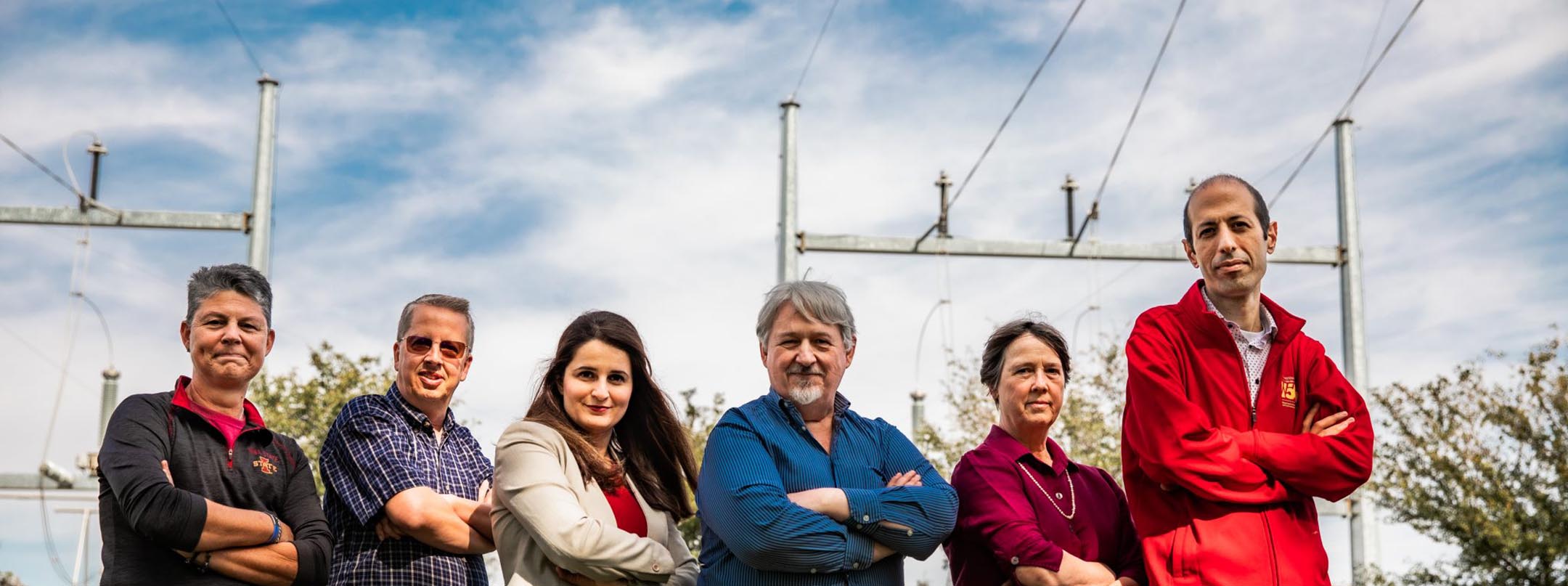Written by Jeff Budlong | Photos by Sarah Hays
Sept. 12, 2023
Power of the team fuels ENDURE's work

The ENDURE team received the Interdisciplinary Team Research Award. Pictured, left to right: Robin McNeely, William Gallus, Alice Alipour, Ian Dobson, Anne Kimber and Behrouz Shafei. Not pictured: Himar Hernandez, Amy Logan, Gary Taylor and Mary Weinand.
The power goes out and as hours stretch to days, food to feed a family begins to spoil. The next paycheck will restock the refrigerator, but the infrastructure damage grinds to a halt the entire community.
That image, said civil, construction and environmental engineering associate professor Alice Alipour, of Iowans' experience after the derecho of 2020, was the impetus for the Electric Network Disaster Mitigation for Utilities in Rural Environment (ENDURE) team.
"The derecho wiped out a large number of distribution and transmission lines owned by public and private utilities across Iowa," said Alipour, who leads the 10-member interdisciplinary effort. "We asked utilities, 'Do you have risk mitigation strategies for your assets subjected to climatic extreme events with the increased intensity and frequency expected with climate change?'"
The overwhelming answer, especially at rural utilities: No.
In 2021, the ENDURE team began developing a digital tool to help utility companies and cooperatives in Iowa and across the nation:
- Assess and predict the expected risk.
- Plan for short- and long-term impacts of climate change.
- Improve situational readiness and responses for natural hazards.
When it's ready for widespread use, the team will make the tool available on an open-source platform.
"We want to make sure it's accessible to everyone, regardless of whether they have the resources to buy a license to use the tool," Alipour said.
Bringing together expertise from across campus and the state earned ENDURE the Interdisciplinary Team Research Award for its commitment to aiding utilities and the people they serve.
We want to make sure it's accessible to everyone, regardless of whether they have the resources to buy a license to use the tool.
Alice Alipour
The team
Alipour and fellow civil, construction and environmental engineering associate professor Behrouz Shafei bring different expertise to the team, but with their knowledge and Electric Power Research Center director Anne Kimber's connections, the team could identify utilities across the state to work with.
"I focus more on the vulnerability of infrastructure components under extreme events and Behrouz looks at the effects of long-term deterioration on their condition state," Alipour said.
Muscatine Power and Water (MPW) is one of five utilities ENDURE works with to test and update data to establish and validate its tool. MPW has the manpower and ability to interface with the team to fix glitches and implement the most useful features. It is the example ENDURE plans to spotlight to other utilities as it looks to expand.
"We have weekly meetings where we share information, and MPW has some key information to help us, like a database of their assets, that's important as we build these modules," Alipour said.
Electrical and computer engineering professor Ian Dobson's focus on energy infrastructure resilience for rural communities. He leads the effort to develop appropriate preventative and corrective actions for utilities. Geological and atmospheric sciences professor William Gallus understands Iowa's changing weather and climatic patterns. His role is to help utilities appreciate the impact and prepare for the intensity and frequency of extreme weather events.
Geographic Information System Mapping Support and Research Facility manager Robin McNeely and research scientist Amy Logan help the team understand outage patterns, relationships, and geographic context. Their work develops the visual platform that comes from sharing information among researchers, utilities and customers.
“This is an effort that could not have been accomplished by the work of a single researcher, nor is it a simple sum of the parts contributed by individual members of the team, but a well-integrated interdisciplinary research endeavor that can lead to a tool to solve the existing needs of utilities across the state of Iowa and beyond,” said Thomas Wall, Argonne National Laboratory program lead, who has worked with Alipour's team on a range of issues presented by climate change.
Going further
Data collection is the heart of the technical design, but not the team's only focus because power disruptions often have significant impacts on residents. ISU Extension and Outreach assistant director for community and economic development Himar Hernandez, community development specialist Mary Weinand and community and regional planning extension specialist Gary Taylor are meeting with people in communities served by rural utilities to talk with and learn from them.
"They are creating focus groups and asking them questions to understand the first- and second-order impacts they see in their businesses and lives because of a loss of power," Alipour said. "The collected feedback delivers a unique source of information to utilities as they decide on investment priorities to enhance the resilience of existing infrastructures, especially those serving resource-constrained communities."
To be the trusted partner for proactive and innovative solutions
Five aspirational statements guide the work of Iowa State's 2022-31 strategic plan.